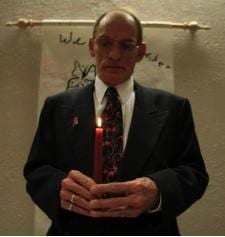Ted Gaudet keeps a list, at his home in Fredericton, NB, of acquaintances who have died of AIDS. There are about 275 names on that list, he says.
Along with a crowd of 40 people gathered at the O’Dell Park Lodge May 24, he lit a candle to remember those he’s lost and those who are still with him, coping and surviving.
It has been a while since there was a candlelight AIDS vigil in the capital city, and it’s the first as a part of the Global Health Council’s International AIDS Candlelight Memorial, which dates back to 1983.
“Over the last couple of years [in New Brunswick] we’ve had a number of deaths, and we’ve had a number of years prior to that where there were hardly any deaths,” says Gaudet. “It sort of brings the reality home to me.”
While living in Toronto, from 1979 until 1988, he recalls friends in the gay community dying at a rate of two-to-three a week.
“You got funeral burnout and you didn’t have time to grieve,” he says.
Gaudet was diagnosed as HIV-positive 21 years ago while living in Vancouver, and he thought his days were numbered. At the time, making new friends and finding love seemed pointless, he says.
He moved home to New Brunswick in the years following, where he got involved with AIDS NB and began to find the community and support he needed to keep going.
Now, he is one of the strongest voices for people living with HIV, not just in the province, but across the country. He’s the newly-appointed regional coordinator for the Global Network of People Living with HIV/AIDS – North America (GNP+NA).
Last month’s memorial was his first project in this role, and it’s his way of giving back to the community that supports him as well.
The event, which coincided with events happening in 52 other cities in Canada and the United States, aimed to offer “a safe environment” to share and reflect on those who are still with us, as much as on those who are gone.
People who are affected by losses, says Gaudet, more often attend AIDS vigils than people who are living with the disease. The international memorial aims to mobilize people with HIV.
Advancements in AIDS treatments and improvements to quality of life, he says, haven’t conquered all the challenges HIV-positive people face.
“Just because we’re living longer, and our health has improved, doesn’t mean there isn’t death around us,” he says.
Stigmas about the disease haven’t gone away either, he adds, and people are still suffering discrimination where they work and live.
Recent statistics from 1985 to 2006 state 455 people in New Brunswick are HIV-positive — the overwhelming majority male. In that time frame, 100 men and women have died from AIDS.
Gaudet realizes the 40 million people living with HIV around the world dwarves the number here, but he says so much focus on the greater epidemic has taken attention away from the region. He, too, felt he was neglecting “his roots.”
“Last year, I suddenly realized in all the work I was doing internationally,” he says. “I had lost touch with my local community, here in New Brunswick, and what was going on in Canada.”
Apart from his work with GNP+NA, Gaudet is also a member of the Community AIDS Treatment Information Exchange, Canadian Treatment Action Council, Canadian HIV/AIDS Legal Network.
Supporting the people living with HIV population is his first priority. He chooses to let others focus on prevention efforts, although he thinks more work needs to be done promoting HIV prevention, specifically amongst gay men.
“I know myself and I know the gay community. We are promiscuous sorts and sometimes we don’t take the precautions that need to be taken.”
Today’s generation of young gay men have become complacent and seem to feel “immune” to the risks of unprotected sex, he says. Gay health organizations, he says, need to pay more attention to self-esteem and issues of insecurity among this demographic.

 Why you can trust Xtra
Why you can trust Xtra


